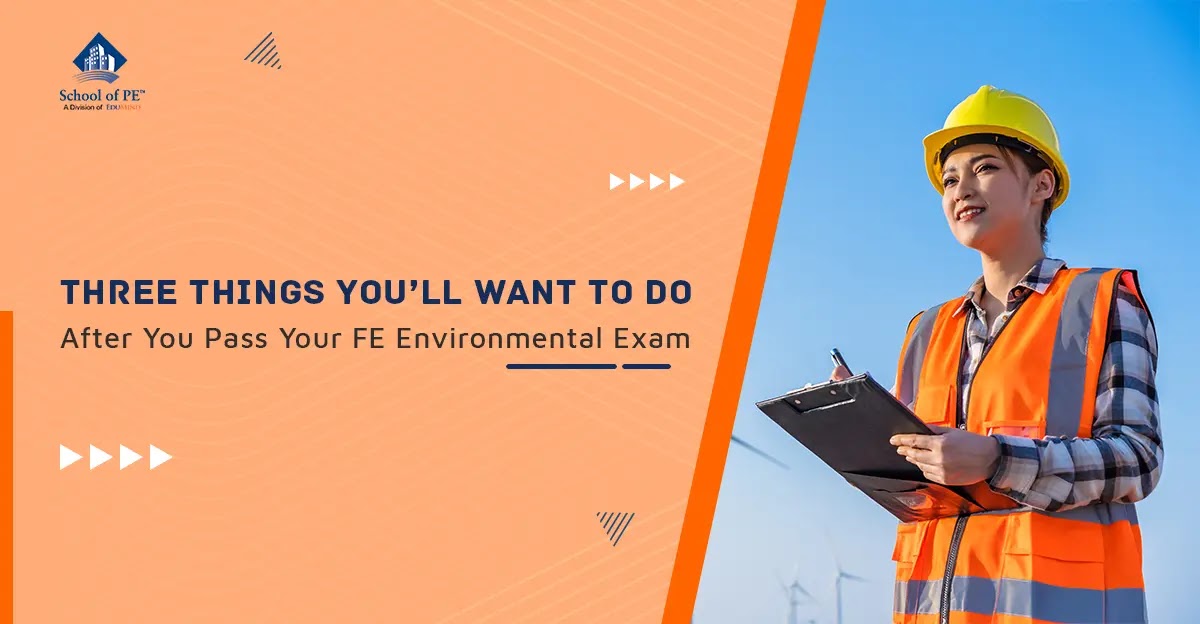Congratulations! It's time to celebrate, because passing your FE Environmental exam is a tremendous accomplishment. You just successfully cleared the first hurdle in your journey to becoming a licensed engineer. According to the NCEES, only about seven in ten pass this exam, an amount which is likely inflated, as low performers self-select out. Your next step after your celebration is to thank everyone that helped you get to this point: your significant other, teachers, friends you neglected while you were committed to studying and friends who helped you with studying, and anyone else that helped support your efforts. Then, if you can, take some time to relax and enjoy the moment before you think about any next steps. When you're ready to continue your journey, the following suggestions will help.

Things to Do After Passing Your FE Environmental Exam
1. Check out the licensing guidelines in your location. Once you're ready to start the next process, begin investigating the license-earning parameters established by the state, territory, province, or district in which you plan on becoming a licensed engineer. Although each location sets its own guidelines on becoming a PE, the general path is the same. If your state has an engineer in training (EIT) status, register for it. While an EIT is not a license, it can simplify the process of becoming licensed later or getting engineering jobs. If your state has decoupled the experience requirement from the PE exam, I would advise you to start studying and complete this test as soon as you can before you begin practicing. Practicing professional engineering in real life is not like taking an exam or studying for a test. As you fall into the professional engineering habit, you tend to fall out of the test-taking habit. Bits of esoteric knowledge fall away, and efficiency and accuracy may be reduced. Once you take this exam, you can spend more time strengthening your daily practical skills in engineering. It is also just nice to be done with the PE exam and relieve any conscious or subconscious anxiety over it.
2. Gain engineering experience. After taking and passing both your FE and PE exams, your priority should be gaining environmental engineering experience. Environmental engineering is too large of a field to fit into a four- or five-year undergraduate degree: regardless of what you specialize in, you will learn on the job and by working with more experienced engineers. NCEES requires you to have a few professional engineers vouch for your experience. The degree of contact required for a reference depends on the exact jurisdiction you are trying to become licensed in.
3. Start building a working portfolio. Keep an Excel file, Word doc, or physical notebook of professional engineers you've worked under with the following information:
- The engineer's name, email address, and phone number
- Your responsibilities under their supervision
- The start and stop date of projects
- The supervisor's name, email, and phone number (if different from engineer)
- The client's name, email address, and phone number
- Calculations you performed
- Inspections and assessments you made
- Anything else related to the project
Don't forget to include important details in this log, like annotating which codes, standards, and regulations you followed as well as indicating which key foremen, tradesmen, and contractors/subcontractors were utilized. Maintaining a detailed and organized log will not only make writing your summary of engineering experience for the professional licensing board easier, but also future projects you work on. Remember to keep in contact with previous employers; a nice practice may be to send a winter holiday or birthday card annually.
In summary: celebrate, express gratitude, register as an EIT if you can, study for the PE exam, gain experience, document your experience, and start networking. Following these steps after passing the FE Environmental exam will make obtaining your professional licensure easier, even if you are not considering it currently. You will be grateful that you set yourself up to succeed easily if you should change your mind in the future. Why close off an opportunity to pursue additional career development?
No comments :
Post a Comment